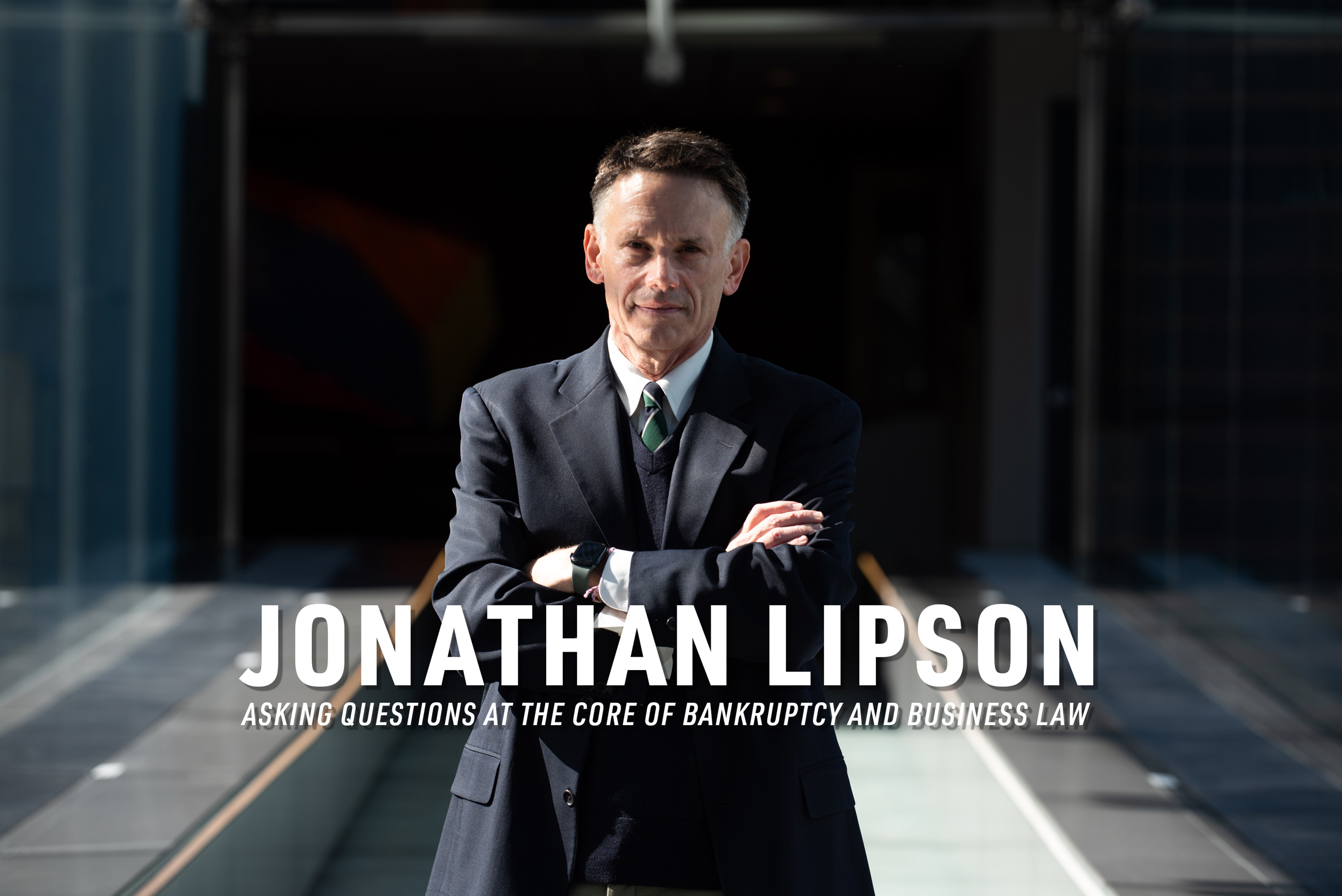
By Suzi Morales
Jonathan Lipson often has a creative and controversial take on business law issues. One might even say he marches to the beat of a different drummer, which makes sense for someone who says – at least partially in jest – that as a young college graduate in the late 1980s, he went to law school because “my band sucked.”
“Everybody I knew was in law school at the time, and I couldn’t think of anything else to do so I just went to law school,” Lipson continues. “Obviously,” he concedes, “the more common approach would have been to find a better band.”
Law school turns out to have been the right decision. Today, as a Professor of Law and the Harold E. Kohn Chair at Temple University-Beasley School of Law, Lipson has questioned whether the bankruptcy regime is equipped to handle what he calls “social debt” questions like those presented by the opioid crisis. He has been widely cited in high-profile bankruptcy matters recently, including the Purdue Pharma bankruptcy brought about by the fallout from the company’s sales of OxyContin and the bankruptcy of former cryptocurrency giant FTX.
A new role for bankruptcy
According to Lipson, bankruptcy has increasingly become the forum to examine larger social harms, which bankruptcy law was not intended to handle. He says that when asbestos companies dealt with mass tort liability through the bankruptcy process in the 1980s, companies began to realize that bankruptcy could be used in this way for even more serious misconduct.
“These problems that bankruptcy wasn’t designed to address … are nevertheless being shoehorned into the process. I call them social debt problems because they involve more than just the failure to pay an ordinary loan, bond, or whatever, which is certainly what bankruptcy was designed to deal with and can deal with very well,” says Lipson.
Drawing parallels in two big cases

Lipson says the Purdue and FTX cases both involve social debt. He believes that one of the parallels between these cases is the way in which bankruptcy attorneys are shaping them.
“They’re totally different cases in many ways, but they’re both fascinating and they do share certain dynamics,” Lipson notes. “I’ve been exploring the role that lawyers play in the process, because I think the common denominator in both cases is the power that lawyers [and] law firms have to shape outcomes.”
The Supreme Court in June 2024 held in the Purdue Pharma case that nonconsensual third-party releases were impermissible under the Bankruptcy Code. Earlier in 2024, the Third Court of Appeals in FTX held that appointment of a bankruptcy examiner was mandatory under certain conditions.
Both cases set precedent, Lipson observed, “in response to maneuvers reflecting the goals and ambitions of the lawyers running the cases.”
Lipson was counsel of record on amicus curiae briefs before the United States Supreme Court in the Purdue matter and before the Third Circuit in FTX. The decisions in both cases reflected Lipson’s positions as amicus. Since the decisions, several media outlets have sought his insight on these matters.
Previously, Lipson represented Peter Jackson, a creditor whose child died as a result of opioids, on a pro bono basis in the Purdue case. Lipson successfully argued that the court should appoint an examiner to independently assess the company’s agreement involving the Sacklers.
Lipson also created and co-hosts a podcast, “Bankruptcy for Billionaires,” that explains the Sackler case in plain English. He hopes to expand the podcast beyond the scope of a single case, with a goal to “help translate what happens in these really complicated, opaque cases, into terms that ordinary people who are now affected by them can understand.”
A narrow question with broad implications

In a forthcoming article in the Stanford Law Review on the FTX case, Lipson, with Professor David Skeel of the University of Pennsylvania Carey Law School, identifies concerns about the role of the company’s bankruptcy lawyers. They argue that these lawyers should not have represented FTX because they had previously represented FTX and company founder Sam Bankman-Fried in other capacities before bankruptcy.
Lipson also argued before the Third Circuit on the issue of whether an independent examiner should be appointed to investigate FTX’s management. Under the U.S. Bankruptcy Code, an examiner “shall” be appointed if certain conditions are met, “to conduct such an investigation of the debtor as is appropriate.” Some courts had held that appointment of an examiner is discretionary. In early 2024, the Third Circuit disagreed, holding that the appointment is mandatory. The court’s request for Lipson to argue, as amicus curiae, was unusual.
Although the appointment of an examiner is a relatively limited issue, Lipson says his concerns about the FTX case are “really about core questions about the role of the judiciary and the role of lawyers, and how much we can trust the process, and how sharp can the elbows of the lawyers be in a civil society system?”
Released in May 2024, the report of the examiner found on the narrow question presented that FTX’s bankruptcy attorneys did not participate in FTX’s fraud in their representation of FTX prior to the bankruptcy filing.
Perhaps reflecting his interest in drumming, Lipson says that challenging law firms, large corporations, and billionaire families “sometimes feels like banging your head against the wall.” Although he is no longer a head-banger, Lipson says that “amicus briefs and appellate practice are sometimes the only way to keep the system in tune and on beat.”
As for the actual rock ‘n’ roll, Lipson still drums in several bands. A few years ago, he even appeared in the Temple Law talent show, along with another professor and some students. The band’s name was Out of Practice, though Lipson is anything but.
